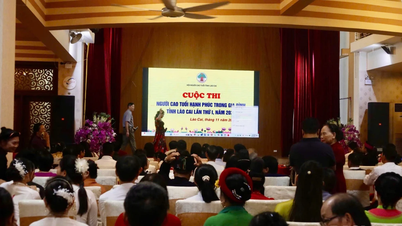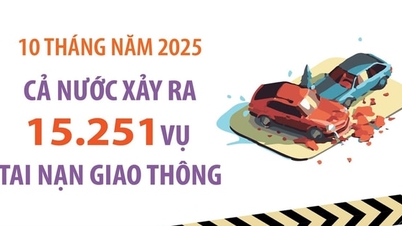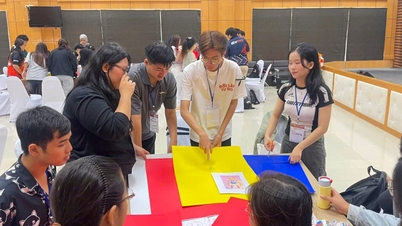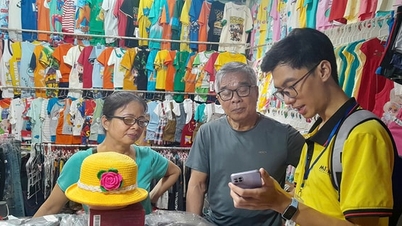These are bad guys who use artificial intelligence (AI) technology to edit the faces and bodies of normal people, turning them into disabled people, then creating sad stories to sell products or call for support. The only goal is to take advantage of the community's compassion for illegal profits.

Sophisticated tricks
A typical case that caused public outrage was the TikTok channel named NL, which posted a series of videos about a woman with both arms amputated, trying to sell products online to support her young children. In the clips, the woman appeared in a simple room, wearing simple clothes, using her amputated arm to introduce products, making viewers emotional and sympathetic. Many people did not hesitate to click to follow, share widely, and even order products to help the mother overcome difficulties. However, when the videos went viral, the online community realized that this was actually the image of a normal salesgirl who had been edited with AI technology to look like a real disabled person.
The trick of appealing to feelings of pity has become a trap that makes many people willing to transfer money or place orders because they believe they are helping a weak and disadvantaged person. Mr. Dang Minh Quang, on Ngoc Lam Street, Bo De Ward ( Hanoi ) shared: "My mother believed in the clip of a woman with an amputated arm selling goods, so she felt sorry and ordered some products sold by this person. When she learned the truth, that the disabled person was just an image created by AI, she was very sad and felt offended."
Quang's mother's story is not unique. Hundreds of others have been similarly deceived. When kindness is taken advantage of, people gradually lose faith and become hesitant to genuine calls for help. And the painful consequence is that the vulnerable are truly severely hurt. On his personal Facebook, Nguyen Sin shared the case of Ms. Tran Thi Nga (36 years old in Phu Tho province) - owner of the channel "Nga Tic Cuc" who is disabled (at the end of 2024, due to acute myocarditis, she was forced to amputate both her arms and legs to save her life), known by many people for regularly inspiring with her optimistic will to live. However, after many cases of impersonating disabled people using AI appeared, Ms. Nga was suspected of using AI to impersonate disabled people.
In recent livestreams, Ms. Nga was upset many times when some social media users repeatedly asked her to “raise her hand” or “crawl” to prove that she was truly disabled. These unreasonable and cruel requests deeply hurt her. The story of “Active Nga” is a heartbreaking testament to how harmful technology abuse can be.
AI-generated fake content recognition skills
According to the Ministry of Public Security, in 2024, Vietnam recorded more than 6,000 online fraud cases, causing an estimated loss of about 12,000 billion VND. In just 8 months of 2025, nearly 1,500 online fraud cases were also discovered. This number clearly reflects the dangerous level of high-tech crime in the context of our country having more than 78 million internet users and 72 million social network users. Cyberspace is becoming a fertile ground for increasingly sophisticated fraud tricks, in which the use of AI to create fake content is the biggest threat today.
Faced with this alarming reality, authorities and cybersecurity experts recommend that people need to equip themselves with knowledge and skills to identify fake content. Deputy Secretary of the Youth Union of Long Bien Ward Police (Hanoi) Nguyen Nhat Ha noted that people should regularly monitor official information sources, proactively update their knowledge about technology and new forms of fraud. In particular, they must always be vigilant and remember the basic principles, which are to carefully verify information sources, not provide personal information to unverified sources, not access strange links, and not transfer money to unverified accounts.
To identify AI-generated videos, according to cybersecurity experts, users should carefully observe image details, facial movements, limbs, or sounds. Signs such as blank eyes, unnatural movements, delayed speech, or mismatched lip movements are often signs of Deepfake technology.
In addition, checking the information posted by the channel, reading comments, and viewing the activity history are also simple ways to evaluate reliability. Along with that, users need to form the habit of verifying before believing. No matter how emotional a video is, it should not be shared or supported hastily.
Experts also called on social media platforms to strengthen censorship, identify content that uses AI to impersonate people with disabilities, and strictly handle violating accounts. Authorities also need to soon issue clear regulations on the use of AI images and content, ensuring that technology does not become a tool for unethical behavior by bad actors.
Source: https://hanoimoi.vn/dung-ai-gia-nguoi-khuet-tat-de-truc-loi-canh-giac-chieu-lua-moi-722565.html



![[Photo] Heavy damage after storm No. 13 in Song Cau ward, Dak Lak province](https://vphoto.vietnam.vn/thumb/1200x675/vietnam/resource/IMAGE/2025/11/08/1762574759594_img-0541-7441-jpg.webp)






































![[Video] Hue Monuments reopen to welcome visitors](https://vphoto.vietnam.vn/thumb/402x226/vietnam/resource/IMAGE/2025/11/05/1762301089171_dung01-05-43-09still013-jpg.webp)



































































Comment (0)